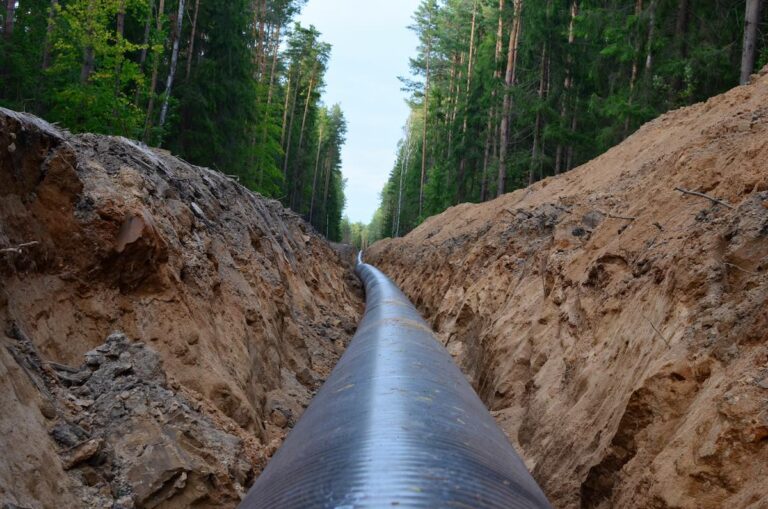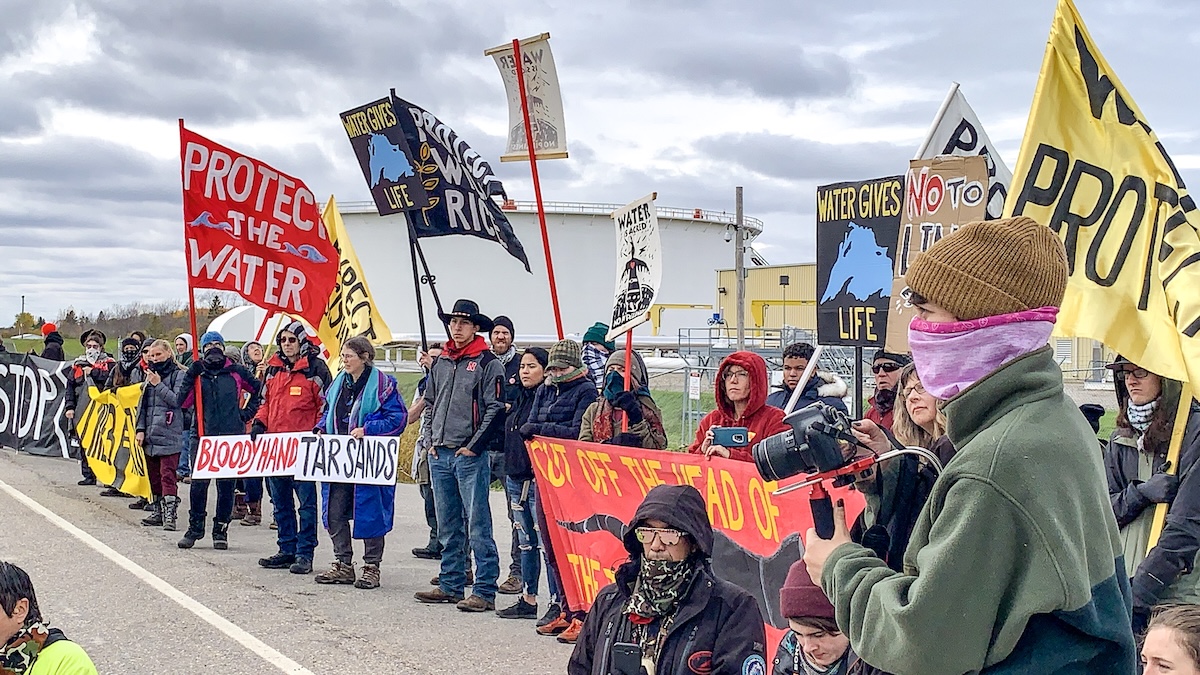Environmentalists said they would appeal a decision by the Federal Energy Regulatory Commission to allow more natural gas to flow through the Northwest
By Alex Baumhardt, Oregon Capital Chronicle
Despite opposition from Northwest Democratic leaders, federal regulators voted unanimously Thursday to allow more natural gas to flow through Oregon, Idaho, Washington and northern California.
The decision, made after a 10-minute reading of agenda items by the four members of the Federal Energy Regulatory Commission, allows Calgary-based TC Energy to expand the capacity of its GTN Xpress gas pipeline. It comes after more than a year of opposition from environmental groups and leaders in California, Oregon and Washington.
Democratic leaders, including U.S. Sens. Ron Wyden and Jeff Merkey of Oregon and Gov. Jay Inslee of Washington, blasted the decision, as did environmentalists. The nonprofit environmental group Columbia Riverkeeper vows to appeal the decision and fight it in federal court if needed.
“We intend to bring all of the arguments we have against it,” said Audrey Leonard, staff attorney of Columbia Riverkeeper.
Michael Tade, a spokesperson for TC Energy, said the said the company needs to expand its pipeline’s capacity due to increased demand from consumers.
“We appreciate FERC’s bipartisan action today to approve the project and will work diligently to place it into service as soon as possible,” he said in an email.
He added that Idaho’s congressional delegation supports the pipeline project, as does Oregon state Rep. Greg Smith, R-Heppner. And Oregon’s two Republican U.S. representatives, Lori Chavez-DeRemer and Cliff Bentz, urged the commission in an Oct. 10 letter to allow the pipeline expansion.
In a statement following the decision, Chavez-DeRemer said the expansion “will boost our energy security while also helping lower utility bills for Oregon families.”
The 1,400-mile pipeline sends billions of cubic feet of natural gas to utilities supplying consumers in the Northwest and California each day. It runs from the Canada-Idaho border to various delivery points, including Malin, a town in southern Oregon’s Klamath County. A westbound spur passes through Klamath Falls and north of Ashland to a point just southeast of Medford.
A detail of the TC Energy map of the route of the Gas Transmission Northwest System shows a westbound spur passing through Klamath Falls and north of Ashland to a point just southeast of Medford.
In October of 2021, TC Energy asked the federal energy commission to allow it to increase its capacity, adding millions of cubic feet of natural gas to the pipeline each day.
Natural gas is almost entirely methane, a potent greenhouse gas and a main contributor to global warming. It’s primarily used to heat homes and businesses, including at least a quarter of all homes in Oregon, according to the state’s Department of Energy.
Oregon’s U.S. Senators Jeff Merkley and Ron Wyden, as well as Washington’s U.S. Senators Patty Murray and Maria Cantwell, all Democrats, urged the commission in a letter Wednesday to reject the pipeline expansion.
“GTN Xpress represents a significant expansion of methane gas infrastructure at a time when California, Oregon and Washington are moving away from fossil fuels,” the senators wrote.
Following the decision, Merkley released a statement calling the approval “outrageous.”
“According to FERC’s own analysis, the expanded pipeline will cause $8.8 billion in damages, and contribute 1.9 million metric tons of carbon per year in pollution to the Pacific Northwest. That is the equivalent to adding 644,000 gasoline powered cars to the road each year. And of course those numbers are misleadingly low because FERC systematically minimizes the climate chaos effects of fossil gas projects,” Merkley said.
Wyden also issued a statement, calling the project “unnecessary, unwanted and unconscionable”: “This pipeline cutting right through the heart of rural Oregon between Umatilla and Jackson counties will increase rates for consumers and enrich a Canadian company with a troubling safety record. I’ll keep looking for every avenue both to battle this monstrosity and to move forward with clean energy that fits with our state’s climate goals.”
Oregon Gov. Tina Kotek and Washington Gov. Jay Inslee had also asked the commission to reject the pipeline. In response to Thursday’s decision, Inslee said the pipeline expansion project is contrary to Washington state laws requiring utilities to transition off of fossil fuels, and that it will saddle future generations with greater environmental burdens.
Expanding the GTN XpressThe Gas Transmission Northwest Express, or GTN Xpress, is a 1,400-mile long, 61-year-old pipeline sending more than 2 billion cubic feet of natural gas from western Canada to West Coast consumers each day. One billion cubic feet is enough to power 5 million U.S. homes for a day, according to the U.S. Energy Information Administration.In 2021, the pipeline’s owner, TC Energy, asked the Federal Energy Commission to allow it to invest $335 million in upgrades to expand the pipeline’s capacity by an additional 150 million cubic feet of natural gas per day.
“Today’s decision by FERC flies in the face of what is morally and economically necessary to protect our communities from the worsening impacts of climate change,” he said in a news release.
And Kotek called the decision “disastrous,” saying it came at a time when “Oregon and Washington are actively working to move away from fossil fuels in response to the clear and present threat of climate change.”
Under Oregon’s Climate Protection Program, greenhouse gas emissions need to decrease 90% by 2050. At least 26% of that reduction will have to come from natural gas. A 2020 Washington law mandates a 95% reduction in greenhouse gas emissions by 2050.
The expansion of the GTN Xpress would result in an additional 3.47 million metric tons of carbon dioxide being released for at least the next 30 years, according to a joint filing opposing the pipeline that was submitted to the federal commission in August 2022 by Oregon Attorney General Ellen Rosenblum, Washington Attorney General Bob Ferguson and California Attorney General Rob Bonta.
Leonard of Columbia Riverkeeper said she is preparing to file an appeal with the federal energy commission. Leonard said she would submit an appeal within 30 days of the commission issuing its final order. The commission then has 30 days to approve or deny the appeal, or ignore it, which would allow the expansion to proceed. Leonard said she’s prepared to file for a hearing in the District of Columbia Court of Appeals so a judge could hear arguments from both sides.
“This case is unique because of the states’ climate laws,” Leonard said. “This is the first time in court we would essentially be arguing that FERC has to consider state climate laws when it looks at whether a project sits in the public convenience and necessity.”
Leonard said the federal commission has a history of approving pipeline projects with little dissent.
A recent review of the federal commission’s major pipeline decisions by University of Virginia School of Law Professor Alison Gocke found commissioners approved 423 of 425 proposed pipeline projects in the last 20 years.
“It illustrates a huge contrast between the Biden admin saying they care about environmental justice and then rubber stamping everything that comes across their desks,” Leonard said.
Alex Baumhardt has been a national radio producer focusing on education for American Public Media since 2017. She has reported from the Arctic to the Antarctic for national and international media, and from Minnesota and Oregon for The Washington Post.


